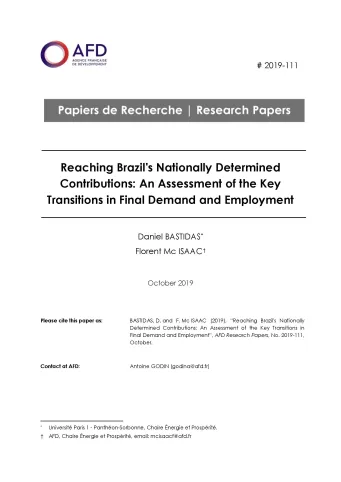Share the page
Reaching Brazil's Nationally Determined Contributions: An Assessment of the Key Transitions in Final Demand and Employment
Published on

Brazil has achieved significant advances in climate mitigation by reducing its greenhouse gas (GHG) emissions in the last decade. Additionally, Brazil commits to furthering its actions through the Nationally Determined Contributions (NDC), issued during the Paris Agreement. The country also anticipates a significant increase in GDP in the years to come. Chen et al (2012)’s main conclusion was that if deforestation were to be greatly reduced, the burden of cutting CO2 emissions from energy use and industrial processes would be minimal. However, recent data on land-use emissions show that additional efforts might also be required in the energy sector. Using Brazil’s industrial structure, we evaluate the minimal changes needed in domestic final demand to meet both the NDC target and the forecasted economic growth. Our results show that it may be possible to meet both objectives with policies that incentivize a service-oriented economy while lowering investments in the manufactuing and extracting sectors. Furthermore, this strategy could be net job-creating, would rely on fewer imported products, and would generate tax revenue. However, wages could decrease.
Useful Information
-
Authors
-
Daniel BASTIDAS, MCISAAC
-
Coordinators
-
Florent Mc ISAAC
-
Edition
-
111
-
Number of pages
-
26
-
ISSN
-
2492 - 2846
-
Collection
-
Research Papers
